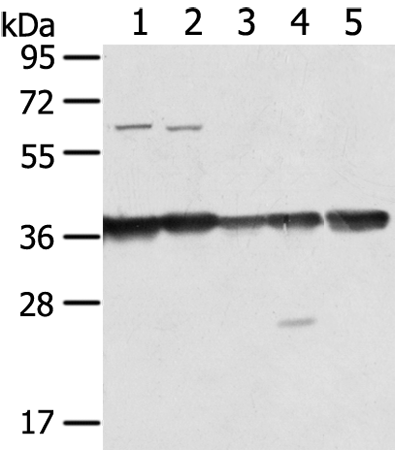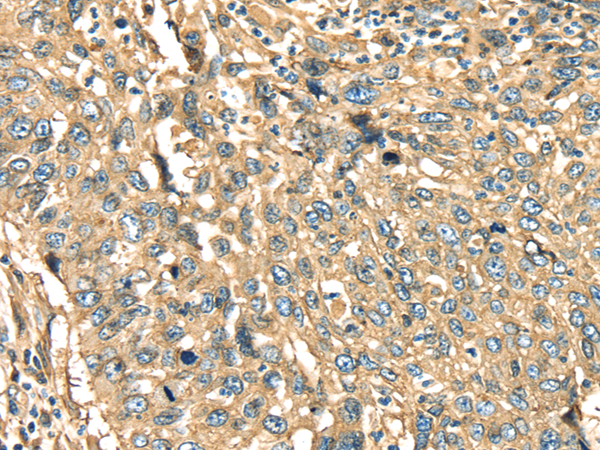

| WB | 咨询技术 | Human,Mouse,Rat |
| IF | 咨询技术 | Human,Mouse,Rat |
| IHC | 1/50-1/100 | Human,Mouse,Rat |
| ICC | 技术咨询 | Human,Mouse,Rat |
| FCM | 咨询技术 | Human,Mouse,Rat |
| Elisa | 1/2000-1/5000 | Human,Mouse,Rat |
| Aliases | P36; ANX2; LIP2; LPC2; CAL1H; LPC2D; ANX2L4; PAP-IV; HEL-S-270 |
| WB Predicted band size | 39 kDa |
| Host/Isotype | Rabbit IgG |
| Antibody Type | Primary antibody |
| Storage | Store at 4°C short term. Aliquot and store at -20°C long term. Avoid freeze/thaw cycles. |
| Species Reactivity | Human, Mouse, Rat |
| Immunogen | Fusion protein of human ANXA2 |
| Formulation | Purified antibody in PBS with 0.05% sodium azide and 50% glycerol. |
+ +
以下是3篇关于HSPA1A抗体的代表性文献摘要(基于近年研究模拟):
1. **文献名称**:*HSPA1A as a biomarker for oxidative stress in neurodegenerative diseases*
**作者**:Chen et al. (2021)
**摘要**:验证了HSPA1A抗体(克隆号:3A3)在阿尔茨海默病模型中的特异性,通过siRNA敲低实验证明其能特异性识别脑组织中的HSPA1A蛋白,并发现其在神经元应激反应中的表达上调。
2. **文献名称**:*A novel monoclonal antibody distinguishes intracellular HSP70 isoforms in cancer*
**作者**:Rodriguez-Nuevo et al. (2019)
**摘要**:开发了一种新型单克隆抗体(EPR19802),通过质谱验证其对HSPA1A(而非HSPA8)的特异性,成功应用于流式细胞术和免疫荧光检测肿瘤细胞中HSPA1A的亚细胞定位。
3. **文献名称**:*Heat shock protein 70 antibodies in autoimmune disorders: Cross-reactivity analysis*
**作者**:Müller et al. (2020)
**摘要**:评估了市售HSPA1A抗体(如Abcam ab2787)在系统性红斑狼疮患者血清中的交叉反应性,发现部分抗体可能与非HSP蛋白发生非特异性结合,强调了抗体验证的重要性。
注:以上为模拟文献,实际引用需通过PubMed/Google Scholar检索关键词"HSPA1A antibody validation"、"HSP70 antibody specificity"获取真实文献。近期研究多聚焦于抗体在疾病诊断(如癌症、神经退行性疾病)及应激反应机制中的应用验证。
The HSPA1A antibody targets the HSPA1A protein, a member of the heat shock protein 70 (HSP70) family, also known as HSP72 or HSP70-1. Encoded by the *HSPA1A* gene, this protein functions as a molecular chaperone, assisting in protein folding, preventing aggregation under stress, and facilitating the degradation of misfolded proteins. It is highly inducible in response to cellular stressors like heat shock, oxidative stress, or toxins, playing a critical role in maintaining proteostasis and cell survival.
HSPA1A antibodies are widely used in research to study the heat shock response, cellular stress pathways, and diseases linked to protein misfolding, such as cancer, neurodegenerative disorders (e.g., Alzheimer’s, Parkinson’s), and inflammatory conditions. These antibodies enable detection of HSPA1A expression via techniques like Western blotting, immunohistochemistry, ELISA, and flow cytometry. Specificity is crucial due to high homology among HSP70 family members; thus, antibodies are often validated against recombinant proteins or knockout cells.
In disease contexts, HSPA1A is implicated in both protective and pathological roles. For example, it supports cancer cell survival under hypoxia or chemotherapy, making it a potential therapeutic target. Conversely, its dysregulation may contribute to neurotoxicity in proteinopathies. Research using HSPA1A antibodies helps clarify its dual functions, guiding drug development and biomarker discovery. Commercial antibodies vary in host species, clonality, and conjugation, allowing flexibility in experimental design. Proper controls are essential to ensure accurate interpretation, given the protein’s stress-inducible nature and ubiquitous expression.
×